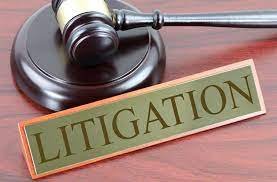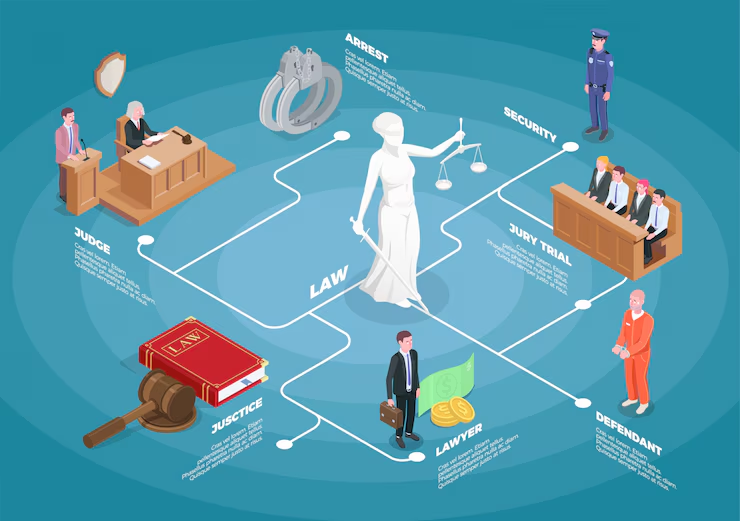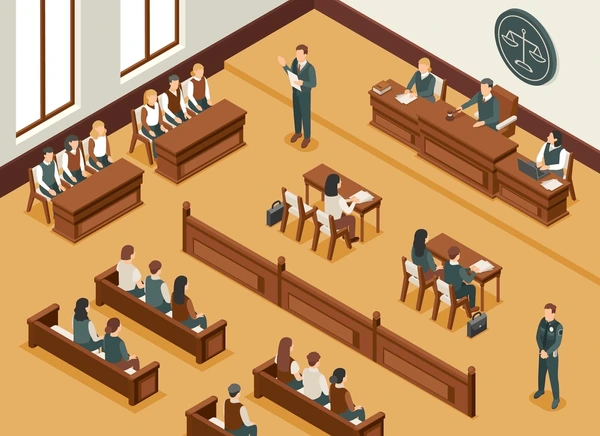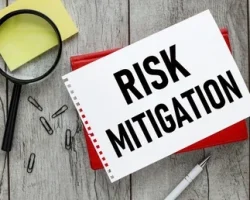Litigation is the process of settling a conflict in a court of law. It is a legal case brought by one party (the plaintiff) against another (the defendant) when there is no agreement that can be reached through informal negotiations or alternative dispute resolution methods e.g. mediation or arbitration. Litigation may refer to civil or criminal proceedings, but the term is most often applied to civil proceedings, such as business disputes, property conflicts, breach of contract, personal injury, and so forth.

What is Litigation?
The process of pursuing a dispute through the courts to settle a dispute between individuals, corporations, or governmental entities is called litigation. It is normally initiated when a party (the plaintiff) institutes a lawsuit against the other party (the defendant) to a court of law. The goal is to receive a legal solution- monetary compensation, enforcement of a contract, injunction, or any other relief that court believes to be correct.
In contrast to informal dispute resolution, litigation is regulated by the rules of procedure and involves the decisions made by a third party who has no interest in the case, a judge or the jury, who decides the case on the basis of the evidence and legal arguments presented.
Litigation is adversarial in nature, in that both parties will present conflicting interests before the court and the government will be left to act as a fair judge.
The Purpose and Importance of Litigation
Litigation is at its heart a private and public interest. To the individual and the corporate entity, it offers a platform to raise complaints and obtain compensation of injustices sustained. Regardless of whether it is a case of unpaid debts, defective products, defamation or professional negligence, the court provides a legal avenue to seek compensation or injunctive relief. To the society in general, litigation is the guarantee of accountability and maintenance of order through enforcing laws, contracts, and social norms. Litigation in most instances may have far reaching consequences that may extend beyond the parties involved especially when it establishes a precedent or when it clarifies an otherwise ambiguous area of the law.
Litigation is adversarial in common law jurisdictions like the United States, the United Kingdom and India. In this type of system, both sides have their chance to present their argument in full and in a fair manner to a judge or a jury of their peers. The principle of audi alteram partem or hearing the other side is the basis of litigation and that justice is not only done but it is seen to be done. This fulfillment of procedural fairness is an important component in ensuring that the population has confidence in the judiciary and other legal systems.
Moreover, litigation is developmental to legal systems to the extent that jurisprudence is made. The interpretations especially by appellate courts are used to guide lower courts and even determine how people will act in future. Numerous laws or legal theories-like contract interpretation or civil liberties-have been influenced by lawsuit. Law Landmark cases These cases frequently arise out of the courtroom setting, causing a change in legislation or administrative policy. The litigation serves as deterrence as well. The fear of lawsuits ensures that individuals and organizations learn to live within the law and respect the rights of other people, act responsibly. This is a deterrent effect that may be impossible to measure but its existence strengthens social and business order.
Stages of the Litigation Process
Litigation typically follows a structured and formal process that includes several key stages:

1. Pre-Litigation Stage
This is the step where parties can seek to resolve the dispute by communicating, negotiating or talking over settlement. It also covers the delivery of legal notices or demand letters. In case of failure of these, the plaintiff might decide to move to court.
2. Filing the Complaint or Petition
The process of litigation formally commences when the plaintiff files a complaint (or a petition) with the correct court. This paper will describe the conflict involved, the legal issues being asserted and the redress or relief being requested.
3. Service of Process
Upon filing of the complaint, the defendant is required to be formally served with the information usually by a process server. This gives the defendant a chance to reply.
4. Response by the Defendant
The defendant has a time frame within which he/she should respond, and this response is called an answer. The response may contain defense or counterclaims against the plaintiff and answer any allegations made by the plaintiff.
5. Discovery Phase
Discovery is the procedure of sharing information and evidence between the parties. This can include written questions (interrogatories), requests to produce documents, depositions and admissions. Discovery plays an important role in the development of a solid case or defense.
6. Pre-Trial Motions and Hearings
Either of the parties can also file motions to address legal or procedural problems prior to the trial. Motions that are common include motions to dismiss or motions to have the case dismissed summarily, which have the potential of terminating the case before trial.
7. Trial
In the event that the case is not settled or dismissed in the course of pre-trial, then the case goes to trial. During trial each party presents arguments and evidence. The trial can be conducted by a judge (bench trial), or by a jury (jury trial).
8. Judgment
The court settles the case after listening to both parties and gives a judgment, which is a written decision on the case, determining the outcome and relief granted.
9. Appeals
In case one of the parties feels that the trial was legally in error, an appeal to a higher court can be made. Appeals are not based on re-evaluation of the facts but how the law was applied.
Costs and Duration of Litigation
Litigation has always been accused of being quite costly and time consuming. Although it provides a formal and binding process of dispute resolutions, it is costly in terms of financial and time commitment. One of the greatest costs in any lawsuit is legal costs. Lawyers tend to bill on an hourly basis which can easily cost thousands or even millions in attorney fees over the course of a complex case that requires preparation, court time and document analysis. In certain jurisdictions, lawyers can accept cases on contingency- meaning the lawyer will only receive compensation in case of a win, but the percentage that will be paid can be very high.
Besides the attorney fees, parties should also take into account court filing fees, the cost of hiring an expert witness, costs of obtaining and reviewing documents, travelling expenses, deposition transcripts and exhibit fees. Discovery is especially costly since the amount of documentation is large and the technical skills needed to examine it are also numerous. In addition, drafting legal briefs, motions and court filings can take an infinite amount of legal research and administrative time, which is to be billed.
The duration needed to settle a legal dispute via litigation also differs widely, and this is dependent on multiple factors, which include the jurisdiction, the complexity of the case, and the backlog of the court. In other countries or jurisdictions, civil cases can languish in courts many years before trial is even reached. Trials (especially high-profile or serious ones) may also be delayed due to procedural motions, examination of evidence or availability of witnesses. Appeals create another time-stratum, with the result that litigation can be prolonged by months or even years.
Such costs and delays tend to affect strategic decisions. In case of some plaintiffs, the cost might discourage them to pursue a lawsuit at all, especially when the anticipated amount of recovery is not very high. On the part of the defendants, the expenses can make them settle despite their perception that they have a good case. Courts have responded to these pressures and, in many jurisdictions, are taking steps to reduce the burdens of litigation, including case management systems, electronic filing, and judicial mediation. However, to parties engaged in litigation, the cost of a long legal battle and the emotional strain is also an important factor.
Litigation vs. Alternative Dispute Resolution (ADR)
Over the past few decades, alternative dispute resolution (ADR) procedures have been increasingly realized as more efficient, flexible and cost-effective alternatives to litigation. DR includes a variety of methods, such as mediation, arbitration, and negotiation, to settle the disputes without using court hearings. ADR does not preclude litigation on all occasions, but it provides parties with a chance to settle disputes in a non-adversarial, expeditious and in some situations, less amicable way.
Mediation entails the third-party who functions as a facilitator to help the disagreeing parties come to a mutual agreement. As opposed to a judge, a mediator does not make a ruling, but facilitates the discussion of issues, the search of options, and the creation of a compromise. Mediation is especially efficient in family law, employment-related disputes, and the conflicts in the community where the maintenance of relationships is significant. Arbitration is usually less formal, cheaper and confidential as compared to litigation.
Compared to mediation, arbitration is more formal but it does not go to court In arbitration, the parties involved resolve to present their case to an arbitrator or panel of arbitrators who make a binding or non-binding decision. Arbitration has become a common mode in commercial and international disputes, where the parties are inclined to choose arbitrators with specialized skills knowledge. Although it is faster, arbitration rulings are in many cases challenging to appeal and this is a matter of concern in terms of due process.
The most informal of the ADR processes, negotiation is a process of direct communication between the parties or representing organizations. It is one of the initial steps to the resolution of any dispute and can be carried out at any point during the progression of a legal conflict. Experienced negotiators usually find a solution that will please both sides and would not be as formal and popular as litigation.
ADR is not appropriate in every case. As an example, litigation may be more appropriate when a legal precedent is required, when there is a need to be publically accountable or when a party is not cooperative. Courts also contribute to the promotion of ADR by making mediation mandatory before trial, or making arbitration mandatory under contract. However, ADR has grown to be an effective tool to litigation, which is more controllable in terms of process and outcome of their disputes.
The Role of Lawyers, Judges, and the Court
The ability to provide quality legal representation and the objective administration of justice is what determines whether a lawsuit will be successful or not. Lawyers take a key role in litigation where they not only represent parties but also advise, negotiate and strategize. Throughout the process of the initial consultation, legal representation and up to the final appeal, lawyers have the duty of ensuring that the client rights are observed, preparing an effective legal argument and adherence to procedures. Their experience in the sphere of interpretation of the law, application of case law and presentation of evidence cannot be neglected on the way of fair solution of a dispute.
In civil matters, the plaintiff s counsel should construct a compelling story that proves the liability and damages. Defense counsel, on the other hand, strive to undermine the case of the plaintiff in a manner that questions facts, attacks it with legal defenses and present alternative theories. In criminal cases, the prosecutor is the representative of the state, and his or her duty is to prove the guilt of the accused by the sense of the reasonable doubt, whereas the role of the defense attorney is to defend the constitutional rights of the accused person and to create a doubt about the guilt of the accused. The ethical demands between the two sides are to be very strict such as honesty, diligence, and loyalty to their client.

Judges, on the other hand, serve as neutral arbiters tasked with ensuring the fairness of the proceedings and the correct application of the law. In bench trials, the judge assumes the dual role of fact-finder and legal decision-maker. In jury trials, the judge oversees the process, rules on evidentiary matters, instructs the jury on the applicable law, and ensures that trial decorum is maintained. Judges have considerable discretion in managing cases, ruling on motions, and crafting judgments. Their impartiality is essential to the legitimacy of the judicial system.
In jurisdictions that use juries, the jury functions as the trier of fact. Composed of ordinary citizens, the jury listens to the evidence presented during trial and renders a verdict based on their interpretation of the facts and the legal instructions given by the judge. The use of juries adds a layer of democratic participation to the justice system, but it also introduces challenges, including the need to simplify complex legal issues and prevent bias or misunderstanding.
The court system itself provides the institutional framework for litigation. Court clerks, bailiffs, court reporters, and administrative staff support the process by managing schedules, preserving records, and ensuring security. Whether in trial or appellate courts, the integrity of litigation depends on a well-functioning judicial apparatus and professionals committed to upholding the principles of justice.
The Future of Litigation
As we look toward the future, the litigation landscape will continue to evolve in response to social, technological, and political developments. One of the most noticeable trends is the continued rise of alternative dispute resolution mechanisms. Mediation and arbitration will likely play an even larger role in relieving congested court systems and offering quicker, more tailored resolutions. Governments and courts are increasingly institutionalizing these alternatives, integrating them into litigation frameworks as mandatory steps before proceeding to trial.
Another trend is the growing emphasis on specialized courts and tribunals. As legal issues become more complex, courts dedicated to specific subject matters—such as environmental law, cybercrime, intellectual property, and family law—are becoming more common. These courts offer technical expertise, procedural efficiency, and tailored remedies that general courts may not be able to provide. Specialized tribunals also play a crucial role in addressing administrative and regulatory disputes that are increasingly central to modern governance.
Access to justice remains a critical concern for the future of litigation. Legal systems in many parts of the world continue to struggle with inequality, delays, and high costs. Innovations such as legal aid reforms, simplified procedures for small claims, and community-based legal services are essential in ensuring that the promise of justice is available to all, not just those who can afford it. Digital technology, if deployed equitably, can also help bridge the justice gap by reducing barriers related to geography, mobility, and cost.
Sustainability and environmental considerations are also shaping the litigation agenda. Courts are being called upon to adjudicate disputes related to climate change, corporate environmental responsibility, and the protection of natural resources. These cases often involve complex scientific evidence, multiple jurisdictions, and high stakes for future generations. Strategic litigation in this area is likely to increase, pushing governments and corporations toward greater accountability and compliance with international environmental standards.
Finally, public expectations around transparency, accountability, and ethical behavior are reshaping how litigation is perceived and conducted. The demand for open court proceedings, fair treatment of all parties, and socially responsible legal advocacy is on the rise. Legal education and professional training must evolve accordingly, emphasizing not only technical competence but also ethical awareness, cultural sensitivity, and civic responsibility.
Conclusion
Litigation remains one of the most essential pillars of the modern legal system. It provides a formal, structured, and enforceable means of resolving disputes, protecting rights, and maintaining social order. Whether in civil or criminal matters, national or international forums, the litigation process ensures that individuals and entities are held accountable under the law and have the opportunity to seek justice through fair and transparent procedures.
Understanding the litigation process is not only important for legal professionals but also for ordinary citizens, business owners, and public officials who may find themselves involved in legal disputes. From the filing of a complaint to the delivery of a final judgment—or appeal—litigation demands careful preparation, legal expertise, and strategic decision-making. The roles of lawyers, judges, courts, and evolving technologies all contribute to the complexity and efficacy of this legal mechanism.
At the same time, litigation is not without its flaws. Its high costs, long duration, and adversarial nature can sometimes hinder rather than facilitate justice. Alternative dispute resolution offers valuable alternatives, but litigation remains the ultimate recourse when rights must be defended, and accountability enforced. In this way, litigation serves both a corrective and preventive function within society.
As the world continues to change—technologically, economically, and socially—so too must the institutions and practices of litigation. Digital transformation, internationalization, strategic litigation, and judicial reform are all reshaping the future of this vital process. Despite these changes, the core principles of fairness, impartiality, and the rule of law will continue to guide the evolution of litigation. For those who seek justice or defend against wrongful accusations, litigation will remain both a powerful tool and a solemn responsibility.



